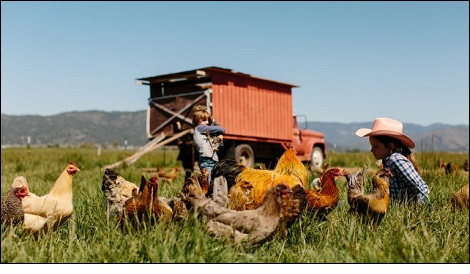
|
|

|
|
| April 18, 2024 |
|
Virus changes how people buy food 
FT. JONES, CA – (INT) - Farmers who sell boxes of meat, dairy, fruits and vegetables directly to consumers are seeing a huge spike in orders as the coronavirus outbreak changes how people buy food.
Food delivery businesses run by local farmers across the country are flourishing as people grow wary of making frequent trips to the grocery store and choosing to cook at home instead of eating out. It’s emerged as a bright spot in the agriculture industry while other types of small to midsize farms are struggling due to many farmers markets shutting down and restaurants and schools scaling back contracts. The spike in traffic for businesses that have been delivering to customers for years has also prompted other farmers to consider adapting their own business models. And many farmers are hoping that it will result in long-lasting shifts in more people buying from local producers rather than commercial grocery stores. “It’s great for farmers and ranchers, we all hope it continues after this is over but I believe it will on some level,” said Mary Heffernan, who runs a cattle ranch with her family in Fort Jones, Calif. “I think it was a wake-up call for consumers to realize they can easily go directly to the source and buy from farmers who ship right to doorsteps all over the U.S. as easily as an Amazon package.” Five Marys Farms, Heffernan’s operation, typically ships about 15,000 pounds of beef, pork and lamb per month, Heffernan said. But that amount has jumped to more than 35,000 pounds in the last two weeks, and the farm has received orders from both returning customers and a flood of new ones. “Business has been very active,” said Hannah Neeleman, who raises pork and beef at Ballerina Farm in Kamas, Utah. “With people staying in and cooking more of their meals, as well as being concerned with food storage, the uptick in our online meat sales has been significant. We ship nationwide and the trend has been true across all states.” Yet local farming operations have also been plagued by shortages like the big-name grocery delivery companies that are rushing to hire more workers to keep up with skyrocketing demand. Instacart, Amazon and Walmart grocery delivery services have also seen a boost — each saw at least a 65 percent sales increase in the past week compared to the same time last year, according to estimates from Earnest Research. But many of those companies are paralyzed by supply chain delays, and now, are confronting worker strikes as employees demand better safety protections and pay. South Mountain Creamery, which delivers milk, eggs, produce and meat in the Washington, D.C. area, has “been overwhelmed with orders,” said CEO Tony Brusco. His company, based in Middleton, Md., has had to stop taking new customers and scale back meat and ice cream orders. Still, farming operations that rely on delivery orders are just a slice of the local agriculture sector, which on average has been struggling since the outbreak began. Local and regional agriculture and food markets stand to lose up to $700 million in sales through May because of the shutdowns caused by the coronavirus, according to an analysis by agriculture economists. Heffernan says she believes the outbreak has proven that the public can support family farms that choose to diversify how products are sold, and it’s possible more farms will start shipping instead of relying on farmers markets and other channels. “It’s good timing for farmers and ranchers who started [shipping] earlier and good for farmers and ranchers to realize there is a direct consumer market,” she says. ”It just has to be easy. Story Date: April 6, 2020
|